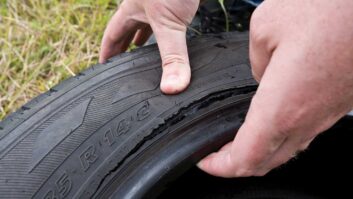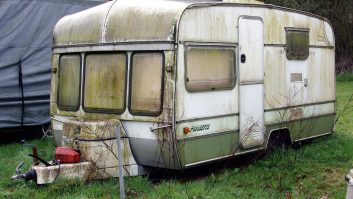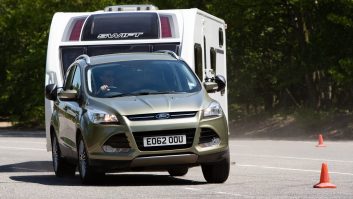Compared with our cars, caravans have it easy. Whether they are tucked away in secure storage, or hibernating under a cover on the driveway, tourers will mostly avoid the worst weather of the year. A tow car is unlikely to be so fortunate, however, which is why carrying out some checks and maintenance tasks can be an important step before setting off on your first tour of the new season.
Although they might not have to do any towing, our vehicles will still be on everyday duty throughout the year. Autumn storms, winter snow, gritted roads – they go through a lot. In some cases, they’ll even be towing in winter.
Every spring, attention turns to our tourer, woken from its slumber for another season of adventures. Yes, cleaning a caravan will be a smart move, as will checking over the appliances, looking out for any caravan water ingress, and so on. But don’t neglect your tow car, just because it’s at work rather than rest throughout winter.
Even the best tow cars for caravans can be put under a lot of strain when pulling a tourer. That’s especially true of the engine and transmission, but the tyres and brakes also face additional demands when hauling a tourer. So even if your car has performed faultlessly throughout the darker months, it pays to make sure it’s ready for the towing season.
To enjoy the first trip away to the full, it’s wise to make sure your car and caravan are safe and roadworthy. Some simple checks can save time and trouble later on and will allow you to hit the road confident that your outfit is in tip-top condition.
If you’re looking for what you can do to get your tourer ready for the new season instead, check out our 10 tips to help you prepare your caravan for spring touring.
Practical Caravan is supported by its audience. When you purchase through links on our site, we may earn an affiliate commission. Learn more
1 The right tyres at the right pressure
Everything your car does – accelerating, steering and braking – depends on the tyres. You need to be sure that the tyres on your car and caravan are safe and legal.
If you switched to winter-specific tyres for the coldest months of the year, spring is the time to revert to summer rubber. Summer tyres will provide far better grip once the temperature rises above 7°C.
Check the tyres to make sure there are no cracks and bulges in the sidewall. You should also make sure that there is at least 1.6mm of tread across the central three-quarters of the tread around the full circumference of the tyre. Check your caravan tyres, too.
If the caravan has been standing still all winter, it’s likely that some air pressure may have been lost. Use a compressor to inflate the tyres to the correct pressure.
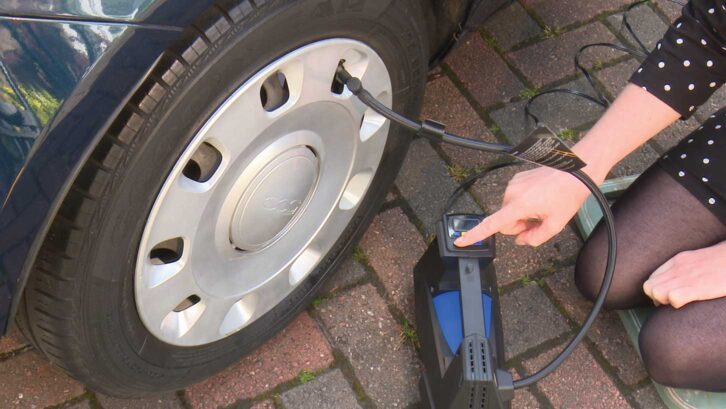
TyreSafe has a very useful online tool for checking the correct pressures, based on the tyre size, the load rating, the number of axles and the caravan’s weight.
Regular tyre pressure checks should be part of routine car maintenance, but don’t forget, the manufacturer may recommend higher pressures for driving with a heavy load or towing. Inflate the tyres to the right pressures for towing before setting off on your first tour of the new season.
If your car has a spare wheel, check the tyre is inflated – it will be no help if it’s flat!
2 Check your towbar
Detachable caravan towbars are common these days. Before refitting the towbar, look for any sign of surface rust. This can easily be removed with an emery cloth or some sandpaper. Use brake cleaner or white spirit to clean the ball afterwards.
Check the mounts for any sign of wear or damage, and once the towbar is fitted, try to move it. The bar should feel tight and secure. If there’s any looseness, have the towing gear checked by a professional.
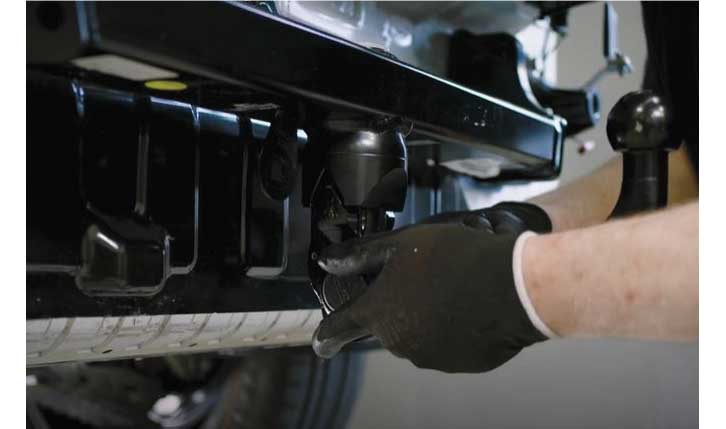
Your car may have a drop-down towbar that’s permanently fitted, stowing neatly away out of sight until needed.
These are very convenient, but it does mean the towball is exposed to the elements all winter. So it’s possible that there will be some surface corrosion come the spring, unless you have fitted a cover for the ball. Remove any rust and clean it as you would a regular detachable towbar.
3 Switched-on electrics
Modern 13-pin electrics should be reliable, but it would be a frustrating start to the season if you were to discover a fault just when you’re about to set off for your first trip of the year.
If you keep your tourer at home, it’s easy enough to attach car and caravan to check that the running lights and the Al-Ko ATC system (if fitted) are receiving power.
We’re concentrating on roadworthiness here, but this is also an opportunity to make sure power goes to the caravan’s battery and habitation equipment.
Even if your van is kept at a storage unit, it’s a smart idea to pay a visit a couple of weeks before your first trip to make the checks. That gives you time to fix any problems so they don’t spoil your early-season getaway.
4 Check the oil
This is a task that most of us will carry out regularly, but it’s also a timely precaution to check your car’s oil level before you begin towing.
As with the other maintenance jobs we’re recommending, do this ahead of time. That way, you’ll have plenty of opportunity to put in more oil if you need to. The owner’s manual should tell you the grade you need.
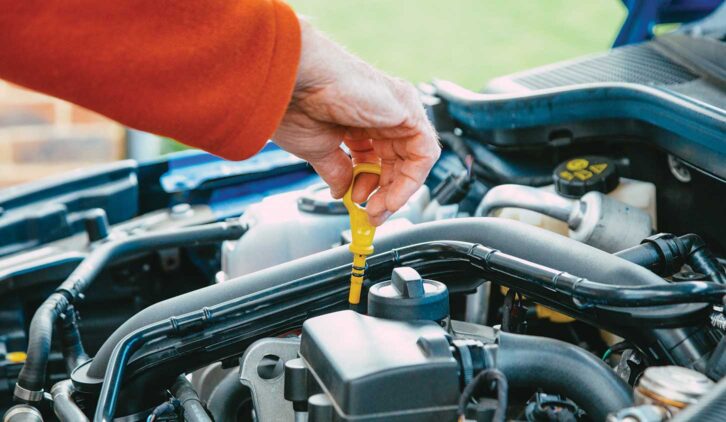
Don’t wait for the low-oil warning light to come on. You’ll already be risking expensive engine damage if the light illuminates.
5 Treat yourself to a caravan-specific sat nav
Sat navs are becoming more sophisticated, but not all of them will be able to adapt routes to suit caravanners.
If you are tired of being sent down a narrow lane to save 30 seconds on your journey, treat yourself to a caravan sat nav that will take account of your tourer’s dimensions when deciding on the best route.
One we rate highly is the Garmin Camper 795, an award winner at the Practical Caravan Awards 2024 and one that comes packed full of features to get you and your tourer safely from A to B.
6 Washer fluid
While you have the bonnet open, why not check the washer fluid? Modern cars tend to have large reservoirs for washer fluid that can last for months without any top-up, but you really don’t want to see the low-fluid warning light coming on just as you are pulling onto the motorway.
The spring is a good time to switch to a summer washer fluid. Although winter fluid is better than nothing, it’s much better to use a summer screen wash, which has been specifically designed to deal with insect residue rather than a frosty screen.
It probably goes without saying, but we’ll say it anyway – don’t use washing-up liquid mixed with water instead. This contains salt and can damage both car and blades.
However high-quality your screen wash may be, it will be ineffective if the wiper blades are worn, so check them over and replace them if they are frayed or no longer clearing the screen efficiently.
7 Expect the unexpected
Most caravan journeys pass off without incident. A tiny handful end early, after a collision or a breakdown. So this probably won’t happen to you, but if it does, you’ll be glad that you were fully prepared. Check the first-aid kits in the car and the caravan are well stocked and that the fire extinguishers are still within date. Replace them if you need to.
Keep a hi-vis vest for all passengers in the car. Stash them in the glovebox or under the front seats, where you can easily reach them.
Even in spring and summer, it can be cool waiting at the side of the road for a recovery truck, so make sure everyone has a coat or a blanket. Take food and drink in the car, even if you plan to stop on the way. You’ll be glad of it if you have a breakdown.
It can also be worth making sure your car will be safe when you’re away from it. Security devices can play a part here, something that our best steering wheel lock guide can help with.
Conclusion
A little preparation goes a long way. Make these quick checks before your first trip of the year, and you can look forward to a safe journey. Here’s to a great season of touring!
Take a look at our top caravan towing tips to see our guidance for staying safe and comfortable on the road too.
Future Publishing Limited, the publisher of Practical Caravan, provides the information in this article in good faith and makes no representation as to its completeness or accuracy. Individuals carrying out the instructions do so at their own risk and must exercise their independent judgement in determining the appropriateness of the advice to their circumstances and skill level. Individuals should take appropriate safety precautions and be aware of the risk of electrocution when dealing with electrical products. To the fullest extent permitted by law, neither Future nor its employees or agents shall have any liability in connection with the use of this information. You should check that any van warranty will not be affected before proceeding with DIY projects.
If you’ve enjoyed reading this article, why not get the latest news, reviews and features delivered direct to your door or inbox every month. Take advantage of our brilliant Practical Caravan magazine SUBSCRIBERS’ OFFER and SIGN UP TO OUR NEWSLETTER for regular weekly updates on all things caravan related.




